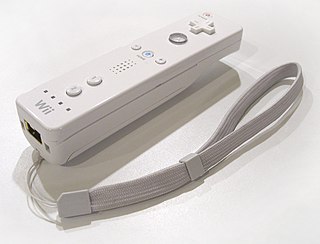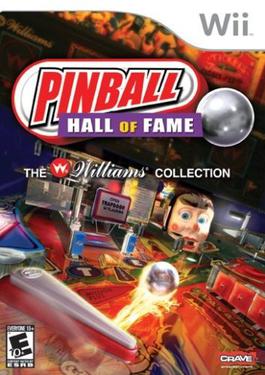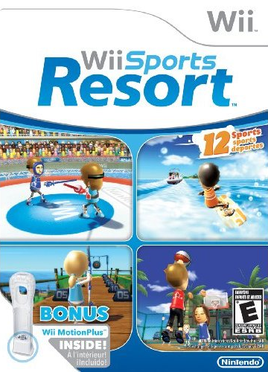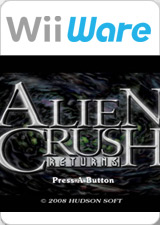
Mario Power Tennis is a sports game developed by Camelot Software Planning and published by Nintendo. The game is the sequel to the Nintendo 64 title Mario Tennis, and is the fourth game in the Mario Tennis series. Power Tennis was released for the GameCube in Japan and North America in late 2004, and in PAL regions in early 2005. The game was ported for the Wii in 2009 as part of the New Play Control! series, and was also re-released as a Nintendo Selects title in 2012. A companion handheld game, Mario Tennis: Power Tour, was also released on Game Boy Advance around the same time as the original GameCube release, bearing the same title as Power Tennis in Europe.

Wii Sports is a 2006 sports simulation video game developed and published by Nintendo for the Wii video game console. The 1.0 (pre-release) version of the game was released in North America along with the Wii on November 19, 2006, and the 1.1 version was released in Japan, Australia, Europe, and North America over the following months. It was included as a pack-in game with the console in all territories except Japan, making it the first sports game included with the launch of a Nintendo system since Mario's Tennis for the Virtual Boy in 1995. The game is available on its own as part of the Nintendo Selects collection of games.

The Wii Remote, also known colloquially as the Wiimote, is the primary game controller for Nintendo's Wii home video game console. An essential capability of the Wii Remote is its motion sensing capability, which allows the user to interact with and manipulate items on screen via motion sensing, gesture recognition, and pointing which is used for the console, using accelerometer and optical sensor technology. It is expandable by adding attachments. The attachment bundled with the Wii console is the Nunchuk, which complements the Wii Remote by providing functions similar to those in gamepad controllers. Some other attachments include the Classic Controller, Wii Zapper, and the Wii Wheel, which has originally been used for the racing game, Mario Kart Wii.

Donkey Kong Barrel Blast is a 2007 racing game for Nintendo's Wii video game console. The game was shown at the E3 convention in May 2006 for the GameCube under the title of DK: Bongo Blast, but this version was ultimately cancelled in favor of a Wii release. It was released for the Wii in Japan and the United States in 2007, and in PAL regions in 2008 with the title Donkey Kong Jet Race.

Samurai Warriors: Katana is an action video game set in feudal Japan and is based upon the Samurai Warriors series by Koei and Omega Force, a spin-off of the Dynasty Warriors series. The game was revealed for the Wii at Nintendo's pre-E3 conference under the name "Sengoku Action".

Wii Music is a music video game developed and published by Nintendo for the Wii video game console. The game was released in Japan and North America in October 2008, and in Europe and Australia in the following month. Wii Music is part of both Nintendo's Touch! Generations brand and the Wii series.

Wii Play is a party video game developed and published by Nintendo for the Wii console. It was released as a launch game for the console in Japan, Europe, and Australia in December 2006, and was released in North America in February 2007. The game features nine minigames, including a Duck Hunt-esque shooting range, a fishing game, and a billiards game, each of which are designed to showcase the features of the Wii Remote controller.

Boogie is a music video game developed by Electronic Arts for the Wii, PlayStation 2 and Nintendo DS. Being touted as a party-game, it enables players to create their character, then use the Wii Remote and a microphone to sing and dance through it. Each song within the game can be performed either as a karaoke or as a dancing game. The game is based around an alien theme. It was one of the first games released in Brazil for the Wii. Although anticipation was high for the game, it received mixed reviews.

Pinball Hall of Fame: The Williams Collection is a pinball video game developed by FarSight Studios and published by Crave Entertainment for Wii, PlayStation 2, PlayStation 3, PlayStation Portable, Xbox 360, and Nintendo 3DS. Players play on a variety of classic virtual pinball machines from Williams Electronics' history. The Williams Collection follows the previous title, Pinball Hall of Fame: The Gottlieb Collection.
Naruto: Clash of Ninja, released in Japan as Naruto: Gekitō Ninja Taisen!, is a series of 3D cel-shaded fighting games based on the manga and anime series Naruto by Masashi Kishimoto. They are developed by Eighting and published by D3 Publisher and Tomy. The series began with four GameCube games, with the first two available internationally and the last two released exclusively in Japan, before splitting into two parallel Wii-exclusive follow-up series: the Gekitō Ninja Taisen EX tetralogy released exclusively in Japan and its international counterpart, the Clash of Ninja: Revolution trilogy. The two Wii series share the same gameplay mechanics, but differ with respect to content and characters, with the international Revolution series being based on a localized version of the Naruto anime series. The first half of the original series and the entire Revolution trilogy are available in North America and Europe, the first two Revolution games are available in Australasia and all games in the series except the Revolution trilogy are available in Japan.

Deca Sports is a sports video game for the Wii developed by Hudson Soft. It is a collection of ten different sports simulations controlled with the Wii Remote.

Mario Super Sluggers is a sports and adventure video game for the Wii developed by Namco Bandai Games and Now Production, and published by Nintendo. It is part of the Mario Sports series, and the sequel to Mario Superstar Baseball for the GameCube. Mario Super Sluggers was released in Japan on June 19, 2008 and in North America on August 25, 2008. It was neither released in Europe nor Australia.

Skate It is a skateboarding video game developed by EA Montreal, Exient Entertainment and EA Black Box for the Nintendo DS, Wii, and iOS. The game is a spin-off of 2007's Skate and was released in 2008.

Wii Sports Resort is a 2009 sports simulation video game developed and published by Nintendo for the Wii video game console and is the sequel to Wii Sports. It is one of the first Wii games to require the Wii MotionPlus accessory, which was bundled with the game. Wii Sports Resort was first announced at E3 2008 and was released in Japan on June 25, 2009, and in nearly all other regions the following month. While Wii Sports Resort was first released as a stand-alone title, it was later bundled with newer Wii consoles alongside Wii Sports.

Alien Crush Returns is a WiiWare pinball video game developed by Tamsoft and published by Hudson Soft. It is a sequel/remake to 1988's Alien Crush, and is the fourth installment in the Crush Pinball series. It was released in Japan on August 26, 2008, in North America on November 3 and in Europe on November 7.

Onslaught is a first-person shooter for WiiWare by Hudson Soft. It was released in Europe on February 13, 2009, in North America on February 23, 2009, and in Japan on March 3, 2009.

Mario & Sonic at the Olympic Winter Games is a 2009 sports and party game developed by Sega. Like its predecessor, it was published by Nintendo for Japan and Korea and by Sega in the Western world. The game is officially licensed by the International Olympic Committee (IOC) through exclusive license International Sports Multimedia. The game is the third official crossover title to feature characters from both Mario and Sonic's respective universes, the first and second being the game's predecessor Mario & Sonic at the Olympic Games and Super Smash Bros. Brawl respectively. It was released on the Wii and the Nintendo DS in October 2009, and is the first official video game of the 2010 Winter Olympic Games.

Just Dance is a 2009 music rhythm game developed by Ubisoft Milan and Ubisoft Paris and published by Ubisoft as the first main installment of the Just Dance series. The game was released exclusively for the Wii on November 17, 2009, in North America, November 26, 2009, in Australia, and November 27, 2009, in Europe.
Deca Sports, is a series of sports video games developed and published by Hudson Soft, a former subsidiary of Konami.














